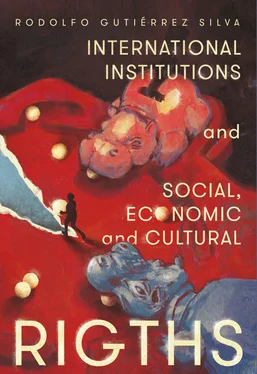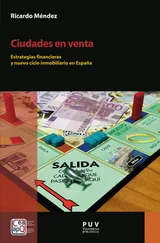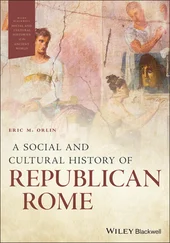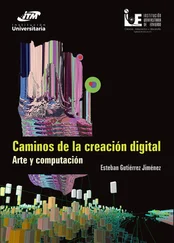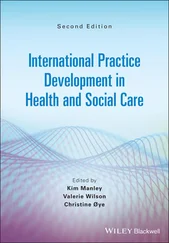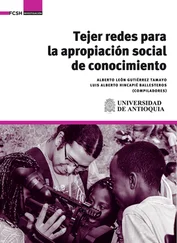Essentially, this book avoids the analysis of many actors precisely to perceive specific patterns that perhaps, through different methodologies, have not been perceived. The qualitative and comparative design of this study allows us to describe a richer picture of the patterns that might not be very visible. Therefore, the methodology includes several case studies24 that analyses the role of international organizations and their interaction with human rights by reviewing different descriptive literature. Attempting to find common patterns in different structures and processes will give us some indication, a picture of the type of problems these institutions are currently facing. Due to the complexity of this phenomenon, the author believes that this type of approach is very convenient and indispensable in order to recognize the impact of international institutions and their challenges. The literature on this topic has also failed to study how international institutions analyze this phenomenon from a social theory perspective. Therefore, this book seeks to examine the interaction of structure and agency and their nature through this particular theoretical framework. By investigating this interaction in diverse settings through different cases, we might be able to see different variations of interactions across space and time.
More specifically, the author chose to evaluate the challenges facing international institutions by looking at different theoretical frameworks that evaluate factors such as the interpretation of Structure and Agency, Post-Washington Consensus, Social dislocations, Social Security, Inequality, Accountability Mechanisms, Refugees and Non-contributory pensions through cash transfers. The hypothesis that this book sustains is that the main challenges facing International Institutions are related to a lack of institutional capacity25. This project is very important since we need to strengthen international organizations in order to confront the challenges and risks that we are facing ahead that are threatening society at different levels and, especially, the poorest. This type of research studies is relevant and necessary due to the current political climate the world is facing, therefore, it is important to continue improving the international system. Indeed, constantly assessing the role that these structures have played in our lives is imperative since it allows us not only to get to know each other on a personal level, but also to open a path for strengthening and integrating the various social groups.
The book has been structured as follows: Chapter 1 begins by providing the reader with the perspective of Oscar Guardiola-Rivera, such perspective involves a decolonial point of view from the global south to think about neo-institutionalism and a contractualism that adjusts to the challenges of today’s society. The main argument of this chapter is that the adoption of a new intentional orientation towards the world based on Objective and Subjective recursive relationships offers a new procedure in order to interpret and act in the world. In a similar vein, Chapter 2 contends that the ideas and practices of the PostWashington Consensus are not taking Polanyi’s warning into account, in fact, this new ideology not only remains strongly committed to market expansion but also, both the World Bank and Stiglitz might be proposing alternatives that intentionally or unintentionally are reproducing the previous neoliberalist regime and increasing social dislocations. A new strategy suggested by Townsend is presented to be explored as an alternative, and finally, crucial elements of a new global strategy are advocated and proposed in this chapter. Then, the central argument of Chapter 3 is that the perception of both the World Bank as well as the un (International Covenant on escr and ilo-Conventions) are likely leading us to the reproduction of an unequal system. It contends that unless a new strategy has a strong focus on reducing inequality we will not be achieving the ideal of Social Justice. On the other hand, Chapter 4 suggests that the growth and evolution of accountability mechanisms in international financial institutions are characterized by a growing accumulation of power at the institutional level as well as at different internal levels such as management. The solution proposed as a crucial step to build strong accountability in international financial institutions is to encourage more independence of these mechanisms as well as to promote the development of a serious attitude of these mechanisms towards institutional reflexivity. This reflexivity might be achieved by designing a coordinated strategy to standardize and improve their organizational, strategic, and accountability processes in order to enhance effectiveness, efficiency, equality, and sustainability, while learning the lessons of the past in order to avoid the repetition of violations. The argument of Chapter 5 is that the Declaration of Cartagena has made a substantial contribution to the Latin American System by setting a flexible framework for the construction of a Common Asylum System aiming to protect the victims, integrate communities and seeking the harmonization of standards and practices in the region, however, many challenges remain, the situation in Ecuador is revealing that, unless robust and strong action is taken by international institutions, Governments and Civil Society, the current Asylum System in Latin America will promote exclusionary and minimalist practices. A Latin American Action Plan is suggested in this chapter highlighting the need for new strategies to be discussed at the regional level using international mechanisms. Finally, Chapter 6 concludes that there is a lack of commitment of the States concerning the operationalization of the principles of Accountability, Transparency, and Access to information. Therefore, it is recommended to develop a strategy to strengthen the control bodies assigned to the monitoring of the new transparency laws in those countries. At the same time, international institutions must develop a new and robust strategy in order to ensure countries strengthen the process of monitoring of cash transfers and non-contributory pensions from a human rights perspective.
Bibliography
Cheng, M. (21 May, 2017). WHO’s annual travel budget: $200 million. Washington Post. https://tinyurl.com/yza9vptq
Center for Economic and Social Rights (cesr) (2012). Assessing fiscal policies from a human rights perspective. https://tinyurl.com/yzkd9vz7
Ginsburg, T. & Huq, A. Z. (2018). How to save a constitutional democracy. University of Chicago Press.
Goldstein, B. D. & Greenberg, M. R. (2018). Global Climate Change and the “So What?” Issue: Reversing the Impact of Donald Trump. Am J Public Health, 108(Suppl 2): S78–S79. https://doi.org/10.2105/AJPH.2017.304264
Graber, M. A., Levinson, S. & Tushnet, M. (Eds.). (2018). Constitutional democracy in crisis? Oxford University Press.
International Commission of Jurists (icj) (26 Jan, 1997). Maastricht Guidelines on Violations of Economic, Social and Cultural Rights. https://tinyurl.com/ydlc2t8v
Levitsky, S. & Ziblatt, D. (2018). How Democracies Die. New York: Crown.
Müller, J. W. (2017). What is populism? London: Penguin.
Mint (27 December, 2017). United Nations cuts budget by $286 million, US claims credit. https://tinyurl.com/yeukeszo
Peet, R. (2009). Unholy trinity: the imf, World Bank, and wto. New York: Zed Books Ltd.
Pinker, S. (2018). Enlightenment now: The case for reason, science, humanism, and progress. London: Penguin.
Sunstein, C. R. (2018). Can it Happen Here?: Authoritarianism in America. HarperCollins.
un Committee on Economic, Social and Cultural Rights (cescr) (2 May, 2016). General Comment N. 22 on the right to sexual and reproductive health (article 12 of the International Covenant on Economic, Social and Cultural Rights). https://tinyurl.com/yz44cgs2
Читать дальше
